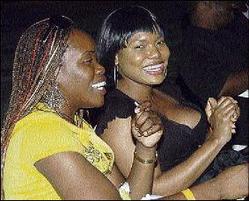Mel Cooke, Freelance Writer

Patrons enjoy a scene from the movie 'Better Mus' Come' at the Flashpoint Film Festival at Fort Charles, Port Royal, on Saturday night. - Photo by Peta-Gaye Clachar
Something very special happened at Fort Charles, Port Royal, on Saturday night.
The most politically fractious period in Jamaican history was thrown up on big screen, the tale of a colour-coded Jamaica caught in the vortex of the Cold War's ideological battle which was fought out in Thir-World countries told in 135 minutes.
The wealth of the nation
Not that the large audience which sat engrossed through director Storm Saulter's Better Mus' Come, the centerpiece of the 2008 Flashpoint Film Festival's second day, was thinking about (Das) Kapital and The Wealth of Nations, Karl Marx and Adam Smith, Carter and Kruschev.
Nor were they concerned with the minor glitches in a not-quite- finished product, which Saulter explained afterwards.
Instead, they followed the beautifully told, detailed story of primarily Skulls gang leader Ricky (Sheldon Shepherd), Shortman (Everaldo Creary) and Flames (Ricardo Orgill) as they fight for words handed down by the Jamaica Labour Party (JLP) leader (played by Karl Williams) and the People's National Party (PNP) chief Roger Guenever Smith, (more effort made to make him like Michael Manley, voice, rod and all).
There is, of course, a healthy dose of violence, Better Mus' Come, the movie ending in a reconstruction of the January 5, 1978, Green Bay massacre, complete with the ambulance which transported men from Southside, Kingston, to the St Catherine army firing range that day.
Ricky, Flames and Shortman are, appropriately, from the JLP.
Woven into the story of their clashes with the PNP faction, led by 'Dogheart', is Ricky's love affair with Kemala (Nicole Grey) and his own struggles with maintaining control over the Skulls while questioning the cause he is fighting for ("How come when I tun' on my pipe me no see no water?" he asks the JLP leader) and seeking personal peace (he is drawn to Rastafari when invited to a Nyahbinghi by his son's teacher, played by poet Sage).
Torn nation
In the beginning, middle and end, Better Mus' Come is the story of a torn nation, excellently told from the day-to-day life on the toughest streets.
When it was over, a few people at Fort Charles stood in appreciation, the extended applause from all testament to the film's impact, as much as the quiet during the film (apart from the segments where persons hooted for their friends on screen or cheered on 'gangsterism') did.
After the movie, Saulter told the audience that he had been working on Better Mus' Come up to half an hour before it was to be shown at Flashpoint, hence there were no credits. He credited not only the cast but also the crew, saying that "film is a very collaborative medium", while Roger Guenever Smith described Flashpoint as "a movement for independent Jamaican film-making".
And Firefly Films' Paul Bucknor said that while it took eight weeks to shoot Better Mus' Come, it took three years to put it together.
"This is the film that we think will make a difference to the industry in Jamaica," Bucknor said, emphasising that from the score to the colouring and all aspects in-between, Better Mus' Come is a totally Jamaican production.
See full review of Better Mus' Come in Wednesday's Gleaner.

